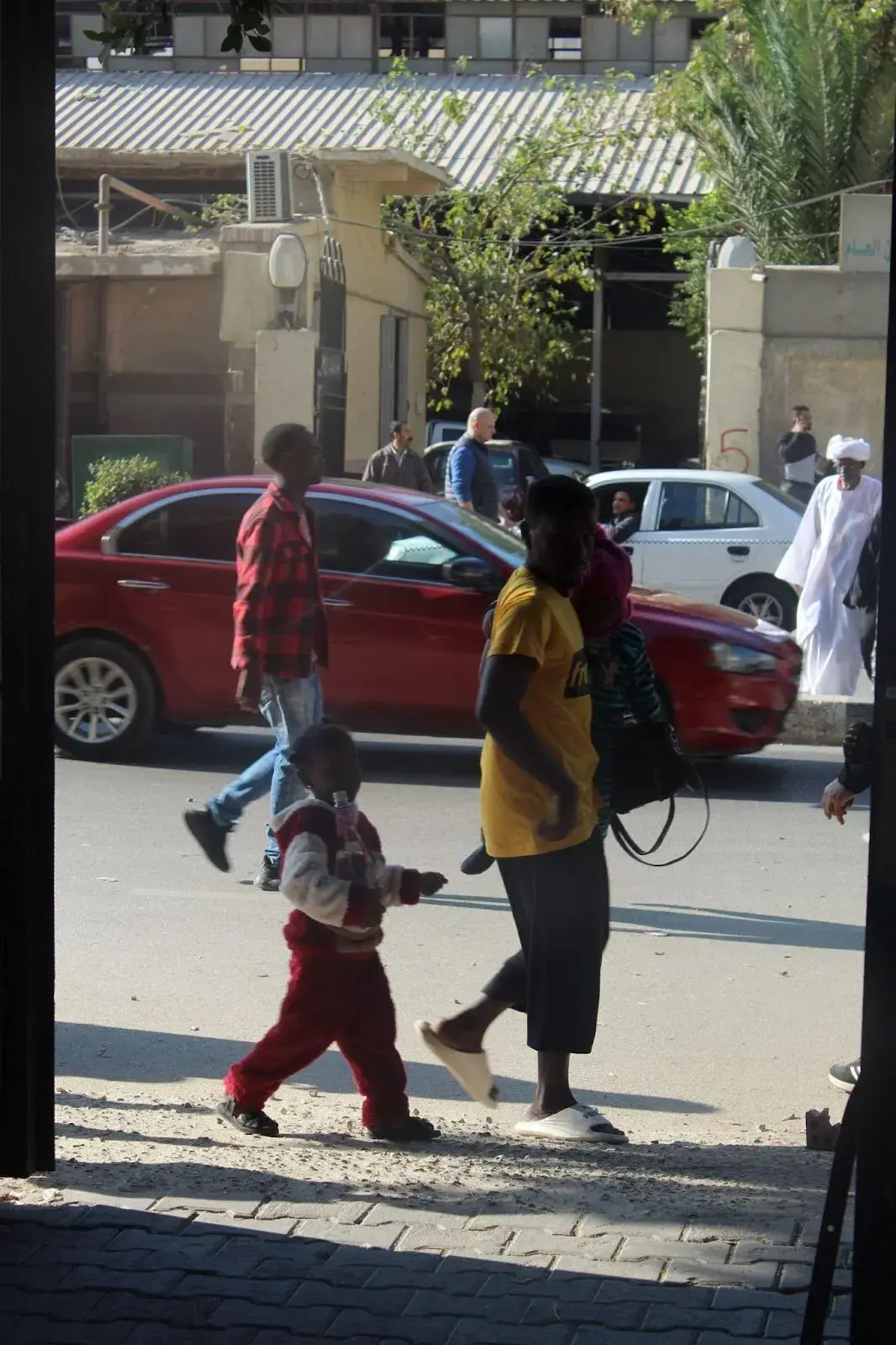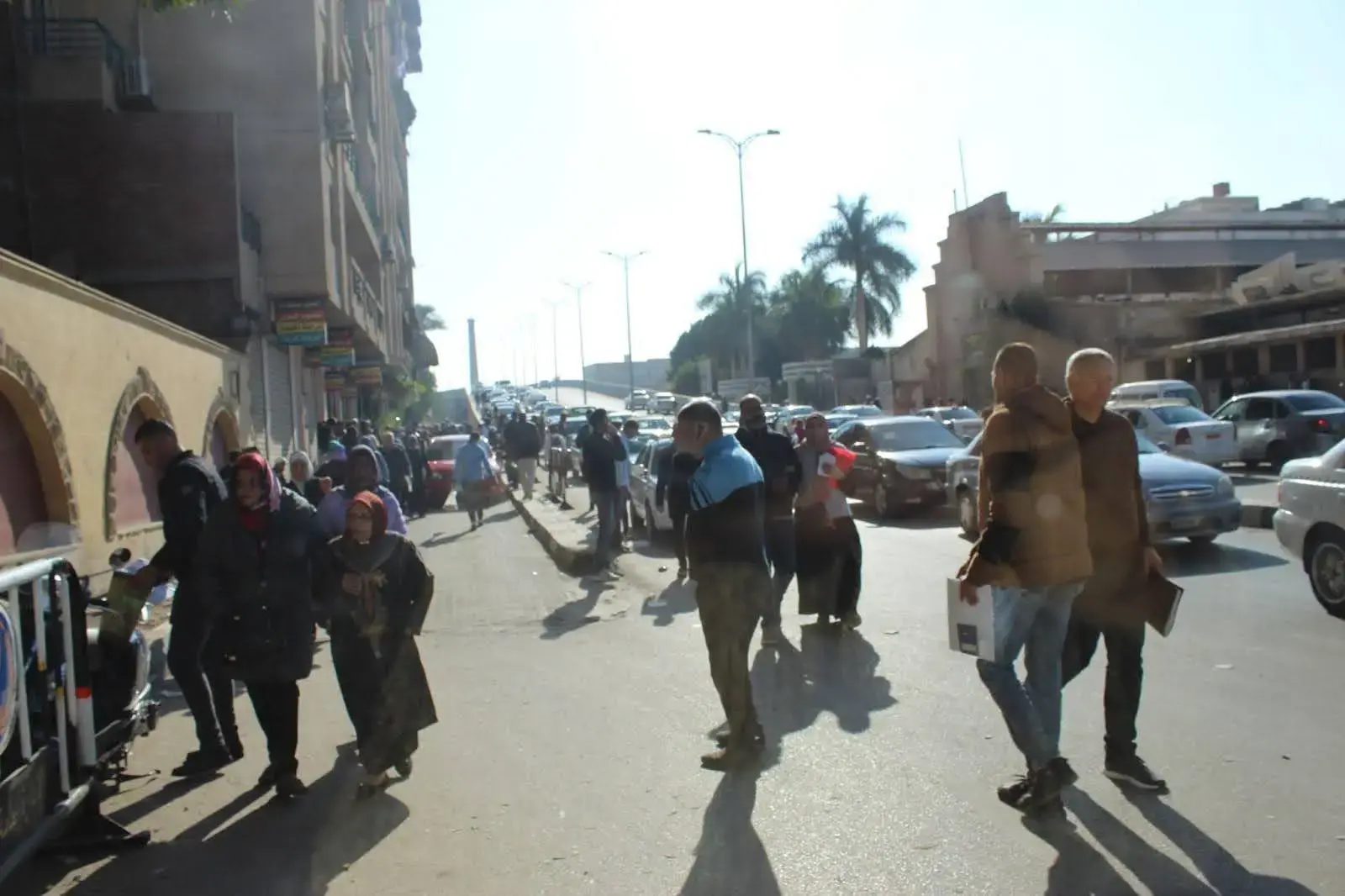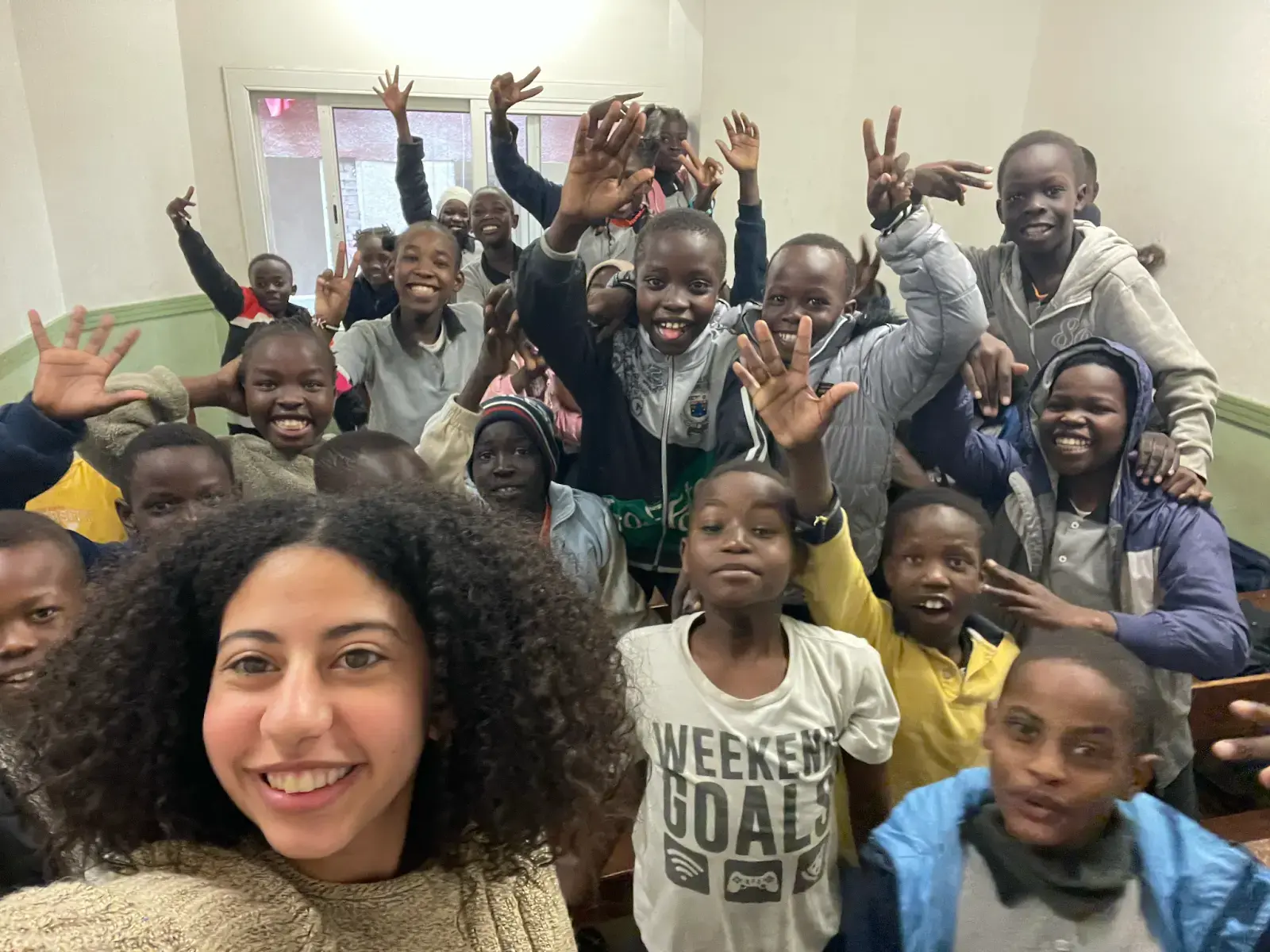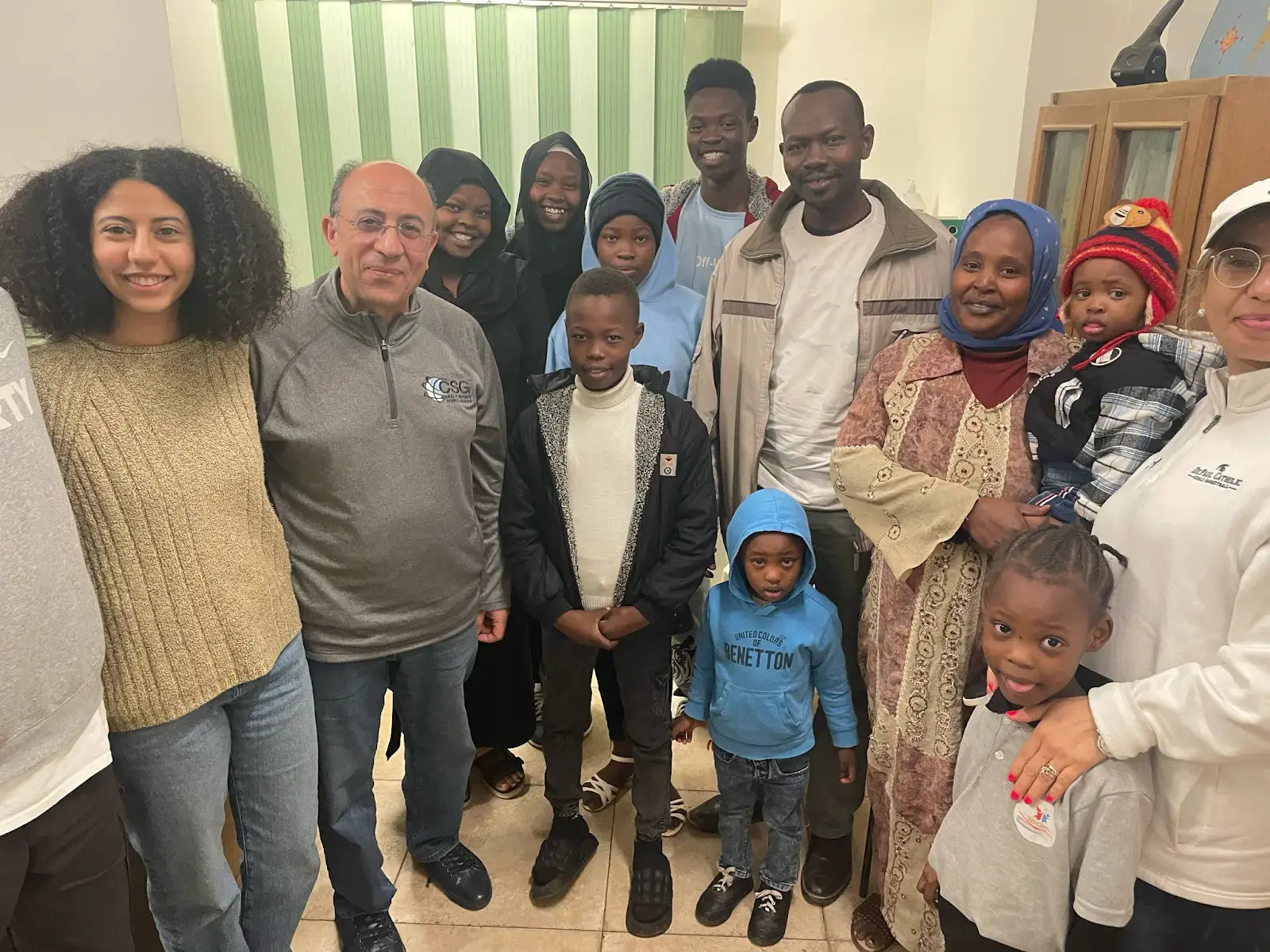
Nagwa Gabriel has no friends in the city. Each day, she receives wages after attending to an elderly Egyptian lady. Then, she promptly returns home to care for her eight Sudanese children.
“I go home, then to work; if there’s something at the church, maybe ... but then [back] home,” she says.
Gabriel, a Sudanese refugee, spoke few words during a 90-minute conversation I had with her and her family. She spoke in Arabic, her native tongue. A native speaker sat beside me, translating Gabriel's words into English.

As a nonprofit journalism organization, we depend on your support to fund more than 170 reporting projects every year on critical global and local issues. Donate any amount today to become a Pulitzer Center Champion and receive exclusive benefits!
She is a private woman who only spoke when prompted. In the absence of words, her attire spoke for her. She is not from Egypt, yet she wore the clothing of a typical Egyptian woman: a patterned gallabaya of red and beige with a calming blue hijab. Her attire reflected her identity; it was an effort to fit in with others.
Her youngest son of 4 sat on her lap throughout the interview. He did not speak to me. Even if he had, he has no memories of his mother’s homeland, only of being an outsider in Egypt.
Gabriel is just one of millions of Sudanese refugees in Egypt. She escaped 10 years ago from Khartoum, Sudan’s capital, and now resides in Cairo. Despite fleeing her home long ago, she is unable to receive refugee status from the UNHCR, the U.N. refugee agency. Her efforts to find protection from the U.N. were fruitless. The UNHCR denied her refugee status claim after she fled from a nonviolent area. She says she left because other people considered her disloyal to the Sudanese government.
“When we left Sudan … we thought it would be a better life here. But in fact, it’s not,” Abu Abbas, Gabriel’s husband, says.
The Sudanese refugees in Egypt exhibit a universal story of isolation. Gabriel and Abbas represent the untold stories of millions across the globe: individuals fleeing their homelands to establish more secure livelihoods. In the process, they experience a loss of connection to their communities and professional identity.
Over three days, I interviewed 14 refugees about their current conditions and mental states. They were willing to speak openly, but some preferred their last names being omitted in this article for their safety and security.
“When I came to Egypt, I felt like I lost everything. I feel scared,” says Priscilla, a refugee who works to support both herself and her sick sister. “I had everything back in Sudan, now I have nothing.”
These refugees primarily live in slum areas. Unable to afford other kinds of shoes, they often walk in sandals in the streets, with their feet casually picking up grime and dirt. The filth embodies their burdens. With each step they take, they take on more affliction.
“When I go in the street, we have some bullying. Other times they beat us, because they say we are not the same,” says Bekry, the eldest son of Gabriel and Abbas. He is 19 years old and hopes to study business after finishing secondary school. His postsecondary education has been delayed as a result of the war in Sudan.

The New Arab, a news outlet, estimates the number of Sudanese refugees in Egypt to be nearly 9 million. With the current war encompassing Khartoum, this number is steadily increasing. Those with family in Egypt seem to integrate better than those without, but all harbor a shared sense of isolation.
All 14 refugees interviewed said they experience unparalleled heartache–all experience the migrant feeling. These refugees collectively search for a sense of belonging, providing a compelling glimpse into how countless other refugees may feel.
“I don’t know what I’m going to do in Egypt. I don’t have family here. We have a different dialect than Egyptians, so when I go out, how do I explain myself?” says Julia. “We are suffering a lot with how to understand each other.”
Julia escaped to Egypt with her elderly mother; like many refugees, her father remains in Sudan.
The influx of refugees has placed an enormous pressure on the Egyptian government. Egypt, a developing country, already faces overpopulation and is experiencing a severe economic crisis. The country’s border crisis—created by the Gaza war—adds to the list of complications the country is experiencing. As a result, the Sudanese refugees are not viewed as permanent residents, but are here for temporary relief and are expected to return home one day.
“Integration is not an option … They’re [Egypt] not in a position to allow this to happen because they don’t have the resources,” says Maysa Ayoub, associate director of the Center for Migration and Refugee Studies at the American University in Cairo. “The reality is that conflicts in the region in Africa and the Middle East do not end. Resettlement happens, but in a very limited way, and it’s in the hands of the generosity of these countries.”
Abbas worked in the agricultural sector before the war in Sudan forced him out. He escaped from his home country with his wife and five children. In Egypt, he and his wife had three more.
“Sometimes, our income is not enough to support our children’s lives. Sometimes we don’t have enough money to afford school, and we can’t share this [information] with anyone else. Or we need to take a kid to the hospital, and we can’t because we don’t have enough money,” he says.
With eyes heavy with sorrow, Abbas relayed the struggles his family has endured. He exemplifies a common refugee truth: Despite living in an overpopulated country, isolation is experienced more often than companionship.
“Even if I’m sick, I have to work to support my family,” he says. “I have to work to pay enough money for utilities and rent. We just want to live a comfortable and secure life.”
However, it is more than just financial burdens; it is about finding a way to begin anew with no direction.
“Refugees have to figure it out on their own. Egypt has been receiving refugees from different parts of the world from a very early time,” says Ayoub. “Because it’s a developing country, it cannot provide services to refugees. They don’t have the technical capacity to assess refugee claims.”

These refugees are burdened with creating a life from nothing. Confusion is experienced more often than understanding. They consistently toil with finances—a well-known struggle. They quickly learn displacement is no means to immediately achieving peace in their lives.
“I am really worried about my kids’ future. Before the war … we had everything,” says Manal. “It’s a big challenge [here] because our kids have to work. We see our kids can’t be educated, so what are we going to do?”
Manal sat across me, wearing a red scarf over her head and a long, black-and-white striped dress. She spoke hoarsely, repeating what she said multiple times and straining to state her thoughts clearly. She has two teenagers: a boy who desires to study economics and a girl who aspires to be a dentist. They currently live in the slums of Egypt.
A gang that periodically appears lives outside their home. Manal says it is hard to keep teenagers in the house all day, a fact that causes her much distress. They have left the danger of their war-torn home only to find danger in a foreign land.
Awatif, who was forced to leave behind her elderly father, echoes Manal’s sense of insecurity: “I miss my younger brothers. I feel more comfortable when I stay in my country—you don’t have that [feeling] here,” she says.
“In this area, they don’t accept us. When we go to the metro, they close their noses,” says Rose.
At the time of the interview, Rose had been living in Egypt for two months. She arrived without her father or brothers and has not been in contact with them since her departure. She relies on nearby relatives and a church to aid in housing and other basic necessities.
With constant influxes of refugees, Egyptians protect their own sense of community through familial relationships. The Sudanese gain a sense of community–and protection–with each other.
“All of the Sudanese help each other out,” says Abbas. “Because we all suffer the same, it is like we gather together and are one union.”

At the edge of the interview table sat Younan, a refugee clothed in a striped beanie, black jeans, and a blue zip-up. Younan was far from being acclimated to Egyptian society, having resided in Egypt for merely two weeks. He says that he arrived in Egypt by truck. For six days, he and 19 other men were strapped together in the back of a cargo truck, traveling at high speeds. As the sun set and light diminished, they continued driving until they arrived to safety.
“Because this is my first time in Egypt, how can I live? Work? I don’t know anything about the street,” says Younan.
Many refugees face an unpleasant experience: one that pendulates between relief and concern. Escaping one problem—like the war—results in finding another, such as financial burdens or a secure residence. During these times, churches, NGOs, and UNHCR are the primary ways refugees seek and find help. While these resources are available, they are overextended.
The Sudanese Displaced Children’s Learning Center (SDCLC) in Cairo provides refugees with a Sudan-accredited education. Rebecca Atallah works as the chairperson of the board, with Ramez Atallah being one of many volunteers who have helped over the years. The Atallahs were my primary contact for the SDCLC and connected me with the Abbas family. They helped provide a safe space for the Abbases to speak about their feelings and hardships.
The refugees’ words only partially reveal their plight. Despite sitting beside them for hours, I know that I did not hear, see, or understand everything they experienced. Time caused much to be withheld. Yet, what was said provides a glimpse at the depths of their desperation and loneliness.
“We are not hoping to own a car or a house. All our dreams are for us to live a safe life for our kids. I need a safe place for my kids to come to school and back,” says Abu Abbas. “In all of this, I am hoping I have enough support until the issue in Sudan resolves, and I can go back to Sudan.”
Hope is on the horizon for Abbas. The UNHCR recently re-opened his family’s case as asylum seekers requesting refugee status. Even with legal refugee status, however, he and millions of other refugees face an uphill climb. These refugees experience endemic poverty and isolation. Their displacement results in heartache. Sudan’s unrest is forcing people out, yet Egyptian society is not welcoming them in.
“I don’t want the kids to be tired the way we [their parents] are tired,” says Abbas. “I don’t want the kids to go through what I am now, because, right now, it’s hard.”












